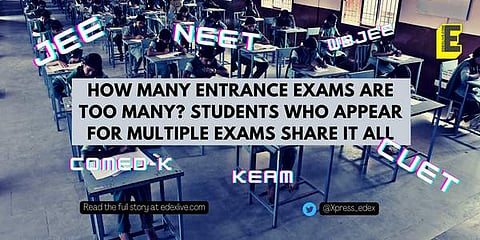

The Joint Entrance Examination (JEE) Main 2023 results were declared recently. With the end of this exam, however, students have no respite, for the National Eligibility cum Entrance Test (NEET) and Common University Entrance Test (CUET) are around the corner, along with many other entrance exams for admission to private colleges, deemed universities and other varsities which conduct their tests.
The saga of exams, with its successes and failures, is often overwhelming for a student who has completed Class XII and directs attention to how in today's world a couple of exams are just not enough.
Reasons vary, always
The reason for writing multiple exams may vary from individual to individual, from trying one's best to make it out successful amidst cut-throat competition to the dearth of a single exam for one's chosen course. A majority of the students feel burnout from studying for numerous exams. Unfortunately, there is no alternative and young minds are painfully conscious of the reality.
"Everyone is now working hard to get admissions to well-known institutes," says Akshara KP, a student who was preparing for NEET and KEAM (Kerala Engineering Architecture Medical), trying to reason out that one of the principal necessities of writing multiple entrance tests is the uncertainty of the results. Whether one will qualify or not is the question and the fear of the latter has students leaving no stone unturned.
"I want to keep all the options open as it's always good to have a backup. It doesn't matter how much each student tries; only a few are going to be selected," says Pranshu Shaleen, an aspirant for JEE, (West Bengal JEE) (WBJEE), Undergraduate Entrance Exam (UGEE) and COMED-K (Consortium of Medical, Engineering and Dental Colleges of Karnataka). He stresses the fact that the traditional entrance tests, like JEE, apart from being competitive, are eliminating in nature.
Pressure is on?
In cases where students are content with one or two exams, society prods them on for more. "There is some pressure from parents as well as from the society. Appearing for multiple exams is what they wish for their ward," says Azim Ahamed, who is applying for Medical, Engineering and UG programmes this year. Some students state that though they are least enthusiastic about writing these exams, they have to write them as they form the stepping stones to their future fields of interest.
Meanwhile, students like Kothapally Sai Sudhamshu, who have an interest in other fields, also have to undergo the same ordeal. Sudhamshu wants to study Business-related courses and is appearing for several tests such as Integrated Programme in Management Aptitude Test (IPMAT) and Symbiosis Entrance Test (SET) among others.
"There is an exam such as JEE for Engineering aspirants and NEET for medical aspirants. But there is no exam for aspirants in the subjects of Commerce. Each good college has its own selection criteria and exam and interview process," he says, emphasising that the competition is increasing day by day. And with that, a coaching culture is on the rise for many such exams.
Coaching culture is thriving
While it is common for JEE and NEET aspirants to opt for coaching, tuitions are starting for CUET and other exams as well. "Besides this, the deletion of NCERT portions from Class XI and XII but including it in the entrance examinations made things harder for the students," says Azim.
Not only studies, but students also have to deal with scenarios in which they see others succeeding or their close friends failing. The situation is doubtlessly depressing, but students mention that with its inevitability, they prepare themselves mentally and try to cope.
A former KEAM and NEET aspirant, Amrutha KV says, "I was mentally prepared for taking up the exam. So according to that, I had planned for it. I accepted the situation (where she couldn't make it) and was happy about the success of my friends." Panshu adds, "I tried to take some rest, analyse my mistakes and try to bounce back again with more effort."
The fact that there are options if one exam doesn't work out itself helps to cope. Besides, students share that though the preparation schedule is hectic, recreation is necessary. Sheba Paul, a former NEET and KEAM aspirant, says that though she used to be exhausted by the end of the day, talking to friends and listening to music helped her manage the stress. Pranshu says he relaxes "by watching videos or reading books of some great people". "Also, exercise and what you consume matter a lot," he adds.
There are upsides...
Whereas stress, tension, and grit are obvious, the corollary of the situation is bright. Writing multiple exams helps students get a well-defined picture of their future. Sheba says the exams helped her learn to manage time and practice a variety of questions. Akshara mentions that she had not decided on a career path and appearing for NEET and KEAM gave her the direction to choose. Amrutha, on the other hand, says that writing the exams made her realise she was not made for the medical field and chose Psychology instead.
The students also state that with multiple exams, the syllabus often overlaps. To the question of whether this is a problem or a boon for them, they say that the overlapping largely helps. Many advise starting the preparation early, and managing the time wisely, for maximising the chances of success. The similarity of the exam pattern also eases the stress, students tell.
